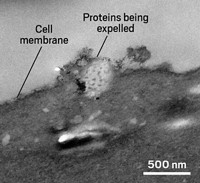Advertisement
Grab your lab coat. Let's get started
Welcome!
Welcome!
Create an account below to get 6 C&EN articles per month, receive newsletters and more - all free.
It seems this is your first time logging in online. Please enter the following information to continue.
As an ACS member you automatically get access to this site. All we need is few more details to create your reading experience.
Not you? Sign in with a different account.
Not you? Sign in with a different account.
ERROR 1
ERROR 1
ERROR 2
ERROR 2
ERROR 2
ERROR 2
ERROR 2
Password and Confirm password must match.
If you have an ACS member number, please enter it here so we can link this account to your membership. (optional)
ERROR 2
ACS values your privacy. By submitting your information, you are gaining access to C&EN and subscribing to our weekly newsletter. We use the information you provide to make your reading experience better, and we will never sell your data to third party members.
Neuroscience
Autophagy-focused Casma Therapeutics debuts with $58.5 million from Third Rock
The biotech will first tackle lysosomal storage disorders
by Lisa M. Jarvis
May 3, 2018
| A version of this story appeared in
Volume 96, Issue 19
Casma Therapeutics has launched with $58.5 million in funding from Third Rock Ventures to pursue drugs that can enhance autophagy, the process used to break down and recycle cellular components.

Researchers have long known that cells lasso dysfunctional or aging components into a vesicle that is sent to the lysosome for degradation. But the particulars of that process have only recently come to light.
In 2016, Japanese cell biologist Yoshinori Ohsumi won the Nobel Prize in Physiology or Medicine for his work to tease apart how autophagy works in bacteria. Casma’s scientific founders have built on that research to identify key players in the process in mammalian cells.
Casma will try to translate those insights into drugs that can boost autophagy. The company is first focusing on a collection of rare genetic diseases called lysosomal storage disorders (LSD). People with LSDs are missing an enzyme that breaks down a key protein or peptide, causing a toxic buildup of cellular waste inside the lysosome. Although enzyme replacement therapies exist for a handful of LSDs, their efficacy is limited because they can’t easily reach the brain and spinal cord. And roughly two-thirds of the 70 known LSDs primarily affect the central nervous system, Casma CEO Keith Dionne points out.
The biotech firm hopes to address LSDs by developing molecules that work upstream of the lysosome. Such drugs could potentiallytreat multiple diseases.
The company’s first challenge will be to develop small molecules that act precisely on the self-destruction pathway. Dionne notes that certain classes of drugs, such as mTor inhibitors, are known to induce autophagy, “but they do it as one of 30 or 40 different things.”
In tandem, Casma will need to develop tests to understand whether its drugs are working. “Currently, there are not good biomarkers that show whether or not you’re inducing autophagy,” Dionne says.
The initial focus on LSDs is expected to help Casma tackle more common diseases marked by a buildup of cellular debris. They include neurodegenerative disorders like Parkinson’s disease, muscle myopathies, liver issues, and inflammation.




Join the conversation
Contact the reporter
Submit a Letter to the Editor for publication
Engage with us on Twitter